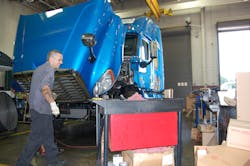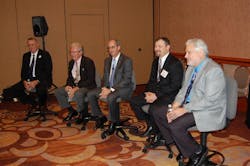The diesel technician shortage currently being experienced in trucking may be more of a management issue rather than strictly a lack-of-personnel problem, according to a panel discussion held during the annual American Trucking Associations (ATA) conference in Las Vegas last week.
According to George Arrants, program director for national training and recruiting at WheelTime Network LLC, the Bureau of Labor Statistics projects that some 76,900 new diesel technicians will be needed over the next decade. Meanwhile, he noted that vocational programs graduate some 10,378 aspiring technicians annually.
“Multiply that [10,378] by 10 years and what do you get? Do we really have a shortage?” Arrants noted during the discussion. “Based on the numbers, we do not have a shortage. It’s not that the schools are not producing enough people; it’s that we are not managing them correctly.”
Arrants pointed to several factors that he believes are causing the “shortage” of skilled diesel technicians in the trucking sector:
- What the vocational programs are teaching are not the skill sets needed by the trucking industry.
- Productivity from new graduates, despite that skills “deficit,” is expected on day one. “That was never expected of our generation,” Arrants noted. “Today we beat them up over it and are surprised when they go elsewhere.”
- Other industries, especially the wind energy and mining sectors, are snapping up new diesel technician graduates faster.
“If you are turning over technicians in your shop, you are abusing the workforce that’s being provided,” Arrants stressed. “Most technicians leave for reasons other than pay; they just tell you that so you won’t bother them anymore.”
His view is that a completely new management style is needed to both recruit and retain the “younger generation” of workers – one that is very different from current management practices.
“We’ve been giving this generation participation trophies since they’ve been six years old; now they are moving into the workforce and we must accommodate that,” he explained. “We need to treat them like we would our grandkids – we need to give them a clean, safe workplace and treat them like they are part of the family.”
Derek Sutherland, manager of fleet maintenance for FedEx Freight, noted that many of the applicants for jobs posted by his shop network only have automotive experience. And while many sport solid computer and diagnostic skills, they are often flummoxed by the mechanical needs of heavy trucks, such as basic brake inspection and repair processes.
“They lack basic ‘Wrenching 101,’” he explained. “They are great at computer stuff but lack mechanical skills.”
To correct that issue, Sutherland said he pairs up veteran “Baby Boomer” technicians with younger hires in a “mentoring” arrangement into order to pass on those mechanical skills.
He also makes sure information is passed along digitally to his younger workers because “a book is foreign to them.”
Sutherland also taps what he calls “engagement” management tactics with millennial workers who are “used to getting trophies for just showing up,” in his words.
“We must reach across that isle and give them that trophy,” Sutherland said, who added that he buys pizza regularly as a way to reward his technicians.
“It may sound trivial, but you’d be amazed at the results,” Sutherland noted. “Because, if you have engaged employees, you are going to get greater productivity.”
About the Author
Sean Kilcarr
Editor in Chief
Sean Kilcarr is a former longtime FleetOwner senior editor who wrote for the publication from 2000 to 2018. He served as editor-in-chief from 2017 to 2018.

